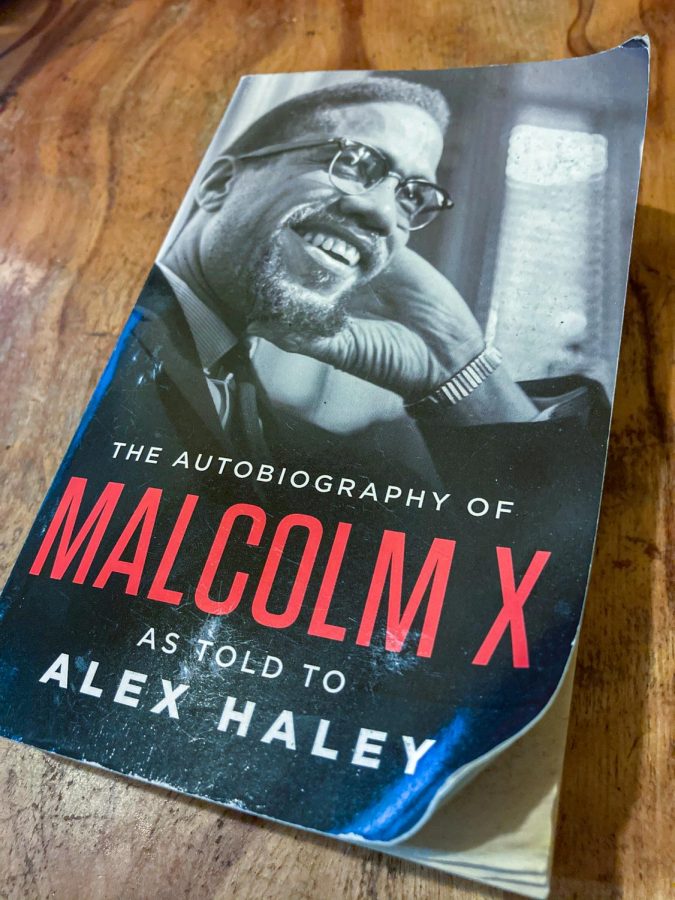Ram Reads: The Autobiography of Malcolm X
July 15, 2020
For my Black and brown friends attending predominantly white institutions, “The Autobiography of Malcolm X” is for you. I didn’t know how much I needed this book until I picked it up and started reading the first chapter. Though the length of the book can seem like a daunting read, trust that every page is worth it.
It has been sitting on my bookshelf for three years now. I don’t think I have read a biography since middle school, let alone an autobiography, but reading someone’s life from their perspective was probably the best move I could make when trying to further my education on people like Malcolm X.
The book reads like a novel but still presents classic, non-fiction information that you would need out of a biography — information as life experiences rather than numerical data. What also contributes to the fluidity of the book is that Malcolm X lives drastically different lives throughout his years. There is never a part of the book that gets boring since every chapter is its own ride; I learned about his early life hopping from Michigan to Boston to New York, his life in jail, his life as a Muslim devoted to Elijah Muhammad and finally, his life after he travels to the Mecca.
A lot of the history I was taught in my early childhood was colonized. I learned about Rev. Dr. Martin Luther King Jr. through a lens of peaceful protesting, but Malcolm X was never once brought up. I learned more about Islam through his life experience than I did in my college-level theology class this year. That’s why this book is such an important read — it filled a lot of the gaps that I was missing from my history lessons.
This book is more than just a tale about Malcolm X’s life; it is a testament to his enduring strength while fighting the disparities and systemic racism that he faced as a Black, Muslim man. He shares his experiences in prison, the good and the bad, and how books and the Nation of Islam inspired him through his sentence. He shares the process of converting to Islam and the mistakes that he made in his own faith journey, like praising Elijah Muhammad.
Some things to keep in mind when reading are how we treat others in our daily interactions and how we contribute to the very systems that hold others back. Malcolm X’s story reminds us that the way we treat people has an influence on other people’s lives and is reflective of the choices we make as individuals. A lot of the people who helped Malcolm X in his early life are still people with whom he kept in touch with after his lifestyles changed. Those human connections carried on beyond any neighborhood’s streets.
This book is a must-read, especially for those who have grown up how I have — in predominantly white areas. A lot of the places in Boston (my home city) and New York (where I go to college) that Malcolm X brings up are places I have been to as a visitor, unknowing of the historical value that they hold. I have walked aimlessly around Harlem and traveled to Roxbury for books and good vegan food without even thinking about the lives that were sacrificed for Black rights on those very streets. This book opened my eyes to look at the world in a way that I hadn’t before.
The best part of this book, and I won’t spoil it, is how personal the end is. You would think that an autobiography is the most personal book you can get, but the way that Malcolm X writes to the reader at the end is a magical experience. It felt like he was there reading alongside me and telling me exactly what I needed to hear once I finally closed the book for the last time.
More Resources to Learn From:
A PDF of “The Autobiography of Malcolm X” can be sent through email. Email [email protected]
Film: “Malcolm X” by Spike Lee
Spoken Word: Malcolm X speeches
Music: Billie Holiday (a friend of Malcolm’s). Also, explore Jazz of the Harlem Renaissance Era
Poetry: “Harlem” by Langston Hughes — describes what Harlem was like while Malcolm lived there
Non-Fiction: “Are Prisons Obsolete?” by Angela Davis — expands on the ideas of Malcolm’s time in prison (Audiobook)
Fiction: “Their Eyes Were Watching God” by Zora Neale Hurston — a classic Harlem Renaissance writer












